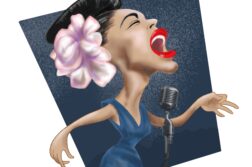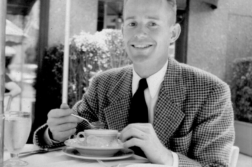“Sweet and Sticky”
Live Tour by Madonna
Hard Candy
by Madonna
Warner Brothers
FROM THE VERY MINUTE we enter this world, we are contained by time. The temporal conditions of our existence are the defining conditions. In his lyrical poem, “As I Walked Out One Evening,” W. H. Auden personifies time as an insuperable force of nature: “O let not Time deceive you,/ You cannot conquer Time.” But if Time, as Auden posits, is virtually unbeatable, Madonna—less a poet than a pop potentate—remains one of the last artists on earth to get the message. Her eleventh studio album, Hard Candy, debuted on top of the Billboard 200 this past summer, and her “Sticky and Sweet” world tour is already underway. Her “Confessions” tour of 2005 grossed more than $200 million, making it the most successful concert tour by a female artist ever. “I’m out of time and all I got is four minutes,” begins the appropriately entitled first single, “4 Minutes,” before the self-anointed “Queen of the World” chimes in with “Time is waiting/ No hesitating.” Madonna has recruited Justin Timberlake to speed things up for her, and treating him like her personal deejay, she huffs: “C’mon boy, I want somebody to speed up for me/ Then take it down slow.” Later, on “Dance 2Night,” she asks Timberlake (23 years her junior): “Are you a one trick pony or do you want to keep running this race?” On “Beat Goes On,” a sharp duet (this time with rapper Kanye West), Madonna bemoans the loss of the “luxury of time” while insisting “the time is right now” since “there is no time to lose.”
Divas, by design, don’t play well with others, and when it comes to temporality, this diva is downright confrontational. “Talk is cheap,” she tells her protégé, and “I don’t have time to waste.” The secret to Madonna’s endurance, after all, is her chameleonic ability to change with the times, and while she turned fifty years old this past August, she still shows no signs of slowing. Ever since the Material Girl hit the big time back in the early 1980’s—when she told Dick Clark on American Bandstand that her career goal was to “rule the world”—she has consistently swum against the heterosexist currents of the American mainstream. Her daring “Vogue” video, now eighteen years old, featured male dancers in conical brassieres, while “Express Yourself” featured the singer in a man’s suit and monocle as a crotch-grabbing captain of industry who beds her hunky steel workers. Only five years ago, the wet kiss she planted on the mouth of Britney Spears at the MTV Music Awards garnered exactly what Madonna has always been after: publicity.
But while gender bending may be a thing of the past for the middle-aged Madonna, time bending has become a fascinating new preoccupation. “There’s no beginning and no ending,” she sings on “Give It 2 Me,” which breathes new life into the lyric “no end and no beginning” from “Like A Prayer” (1989). Time, especially the prospect of running out of it, unites the final two albums she recorded to complete her contract with long-time label Warner Bros. (Freeing herself from the moribund record industry, Madonna recently re-signed with LiveNation, a live events company that will allow her to better capitalize on what can’t be downloaded, traded, and pirated: her spectacular  on-stage performances. LiveNation is hoping she’s worth the $120 million price tag.) Hard Candy, meanwhile, picks up where 2005’s Confessions on a Dance Floor leaves off. “Time goes by/ So slowly for those who wait/ No time to hesitate,” she sang on the ABBA-inspired “Hung Up,” while on “Jump,” she crooned: “I haven’t got much time to waste/ It’s time to make my way.” This confectionary follow-up, cut from the same polyester cloth as Confessions, similarly eschews ballads in hot pursuit of the dance floor. On “Voices,” with its nod to S&M sex (“Who is the master?” Timberlake queries, “Who is the slave?”) and its sultry echo of Madonna’s most underrated album, Erotica (1992), she again taps her watch impatiently: “Haven’t you had enough?/ Now your time is up/ Baby, show me your hands.”
on-stage performances. LiveNation is hoping she’s worth the $120 million price tag.) Hard Candy, meanwhile, picks up where 2005’s Confessions on a Dance Floor leaves off. “Time goes by/ So slowly for those who wait/ No time to hesitate,” she sang on the ABBA-inspired “Hung Up,” while on “Jump,” she crooned: “I haven’t got much time to waste/ It’s time to make my way.” This confectionary follow-up, cut from the same polyester cloth as Confessions, similarly eschews ballads in hot pursuit of the dance floor. On “Voices,” with its nod to S&M sex (“Who is the master?” Timberlake queries, “Who is the slave?”) and its sultry echo of Madonna’s most underrated album, Erotica (1992), she again taps her watch impatiently: “Haven’t you had enough?/ Now your time is up/ Baby, show me your hands.”
From “Like a Virgin” (“touched for the very first time”) to “Like A Prayer,” Madonna has always enjoyed blurring the lines between erotic and religious rapture. For her, the spirit is in the skin. Never before had genuflection and fellatio been as salaciously mixed as they were on this latter hit single: “Oh God, I think I’m falling/ I’m down on my knees/ I want to take you there.” (An ode to cunnilingus, called “Where Life Begins,” followed on “Erotica.”) On “Hard Candy,” the dance floor functions similarly as a space, like the confessional and the bedroom, in which one should express oneself fully, and the whole album might be reasonably retitled, with Auden in mind, “As I Danced Out One Evening.” “Candy Shop” is precisely the right song to open “Hard Candy,” because it signals that Madonna-rama is once again open for business. “Come on into my store/ I got candy galore,” she purrs, “I got Turkish delight/ And so much more.” Her candy shop, naturally, also has a dance floor out back. “On any given night/ Catch me on the floor,” she sings unapologetically on “Heartbeat.” “I’d rather not explain/ For me, it’s just usual.” Dancing becomes a way to grab hold of time, to step to the beat, or, as she sang on “Into the Groove” (1985), to “move in time.”
Like Oprah Winfrey or Martha Stewart, Madonna is as much a brand name as a person. The House of Madonna, with an estimated net worth of $600 million, has a life of its own. But Madonna’s own life has recently been rocked by two unhappy developments. First, news of Madonna’s divorce from film director Guy Ritchie was soon followed by rumors of an affair between her and New York Yankee Alex Rodriguez (reported to have made late-night visits to Madonna’s Manhattan apartment to discuss Kabbalah). Tabloids aside, the cracks in the Ritchie marriage show up on the song “Miles Away,” in which she laments the end of the affair: “I guess we’re at our best/ When we’re miles away/ So far away.” Here, it is geographical space rather than time that gets the better of her. On “She’s Not Me,” Madonna elbows the other woman out of the way, singing: “She started reading my books/ And stealing my looks/ And lingerie.”
The second shock to Madonna’s system was the publication of Life With My Sister Madonna, a tell-all book by her younger and openly gay brother Christopher Ciccone, who once worked intimately with his sister as her dresser, interior designer, and consigliere. Christopher possesses what he calls the “blunt Ciccone tongue,” and not surprisingly his memoir is brimming with its own juicy confessions. “I was born my mother’s son,” he writes, “but I will die my sister’s brother.” After the 2000 premiere of Madonna’s box office bomb, The Next Best Thing, he recalls telling her that “she was great” in the film, but admits in print that “this isn’t true” and that she “has no idea whatsoever how bad she is in the movie.” Apparently, Ciccone still hasn’t forgiven Madonna for outing him to the Advocate in 1991, which he saw as “an apparent ploy to garner support for [the film Truth or Dare]by ingratiating herself with her gay fans.” This is more of the same, says Ciccone, since “Madonna used my mother’s grave as a movie location.”
Elsewhere, he attributes his sister’s sometimes weak vocals to her unwillingness to humble herself to formal training. “Her moves are, indeed, terrific,” he writes. “Her voice, however, is another matter.” He singles out Guy Ritchie in particular as a homophobe who drove a wedge between the two. But Ritchie emerges as little more than a fall guy given that Ciccone’s numerous grievances tend toward the financial. He includes an interminable chain of e-mails between Madonna and himself regarding outstanding balances and her insistence that he enter rehab for substance abuse. Of course, there’s a catch in her offers to pay for therapy: the doctors will have to supply her with weekly progress reports, a move that prompts one doctor to state the obvious: “Your sister has control issues.”
There’s a litany of entertaining vignettes in Ciccone’s Life to balance the bitchy betrayals: Warren Beatty driving both siblings to the Wiltern theater in L.A. in a gold 560 Mercedes while discussing his own older sister, Shirley MacLaine; Sean Penn firing a loaded .45 at the helicopters swarming above the couple’s Malibu wedding in 1985 while Andy Warhol and Cher (in a “purple spiked wig”) look on in amazement. Then there’s Madonna running to her brother’s aid (in “black satin pajamas with white satin piping from Harrods,” he adds) after a screaming match with Penn on the set of another turkey, Shanghai Surprise. In the end, Ciccone wishes his big sister well, but he clearly doesn’t share her stated sentiment that “blood is thicker than any other circumstance” (in “Keep It Together”) or that “the only thing you can depend on is your family” (from “Jump”). To be sure, Madonna will rise above such setbacks, and even if her label is starting to show some wear, there is simply no other ego as rapaciously and inexhaustibly fascinating as hers. As the Queen herself concedes on “Heartbeat”: “It may feel old to you/ But to me, it feels new.”
Colin Carman teaches in the Dept. of English at the University of California, Santa Barbara.





